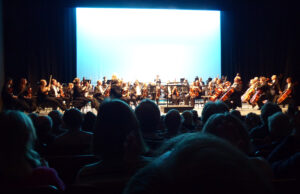Pianist shines in spite of a dull LPO and conductor Catherine Larsen-Maguire

The London Philharmonic Orchestra with Ms Catherine Larsen-Maguire at the end of the Concert at the Congress Theatre, Eastbourne.
It has long been a contention of mine that there should only be one version – identity – of a symphony orchestra. Sadly this is not always the case, and the wilds of the UK, often referred to in touring circles as The Regions, is a case in point. Usually this is a factor of cost. An orchestra sends a band made of some of its key players from London, and then fills the rank and file with local musicians. If you want to hear the orchestra play at its best, go (in the reverse order) to London, or a recording studio or a city abroad when the orchestra is touring. That’s when their top musicians will deign to appear together, and particularly on a foreign tour.
Sadly, when it comes to a one-off concert in the depths of Sussex, albeit at one of the country’s finest concert halls, the Congress Theatre in Eastbourne, it would appear that all too often the orchestra management feels the top team isn’t warranted. Does this mean that the patrons of the Congress are not worth the best, and must accept a band that’s below par? In today’s world, when one can buy a tin of baked beans and everything that’s in it has to be clearly specified on the label, the same doesn’t seem to apply to an orchestra’s name. After all, a MacDonald’s bought in Eastbourne or Manchester should taste the same and be of the same quality as one bought in London, and it generally is. That’s what we expect when we buy our Big Macs. Why should this not be so with the name of the orchestra? I for one think it should.
So at Sunday’s concert one could tell in the first few bars that, sadly, we had the B Team. The performance of Beethoven’s Egmont Overture was tentative and carefully-stepped, from both orchestra and conductor, with some uncomfortable scraping sounds from the fiddles and a few wrong or off notes, and one quickly felt that the achievement here was not in the interpretation of the work but in getting through it.
Igor Tchetuev brought some fine playing to the Tchaikovsky Piano Concerto. It was written in 1874/5 and although the composer’s close friend Nikolai Rubinstein – younger brother of Anton, no relation to Arthur – initially didn’t like the work and recommended many changes to which the composer furiously declared, “I shall not alter a single note!”, it quickly became an enormous success. (My grandmother first played it aged 13, with Sir August Manns at the Crystal Palace, causing a sensation, such that the composer himself wanted to meet her).
Mr Tchetuev has a most capable technique, can produce a good range of dynamics and tone and clearly wanted to provide the Romantic excitement, passion and beauty that are required in any performance of this work. Sadly, in the first movement the interchange with the orchestra did not do him justice; as he pushed to move forwards and build the excitement, he was met time and again with and thwarted by a fractionally late pairing from Ms Larsen-Maguire and one could see or sense, I felt, the pianist’s growing frustration. On two occasions I myself wanted to stand up and shout out, “Come on!” to the conductor and orchestra.
The LPO opened the slow movement, marked with (the rather ambiguous) andantino semplice, with some further imprecise control on the violins in the pizzicato section from Ms Larsen-Maguire. There was some lovely playing from the principal cellist, and the orchestra and piano at last came together and showed their potential in the D minor central section, with beautiful sounds throughout. Sadly it wasn’t to last. The final movement, allegro con fuoco, didn’t have much allegro or fuoco. Mr Tchetuev drove the work forwards with determination and as much fire as he could muster, but the conductor and orchestra couldn’t match his considerable performance and talent. Other than from the pianist, the fire just wasn’t there.
It’s probably the case that all the rehearsal time available was the standard 3 hours on the day, and the work that tends to get the most attention is the principal showpiece for the conductor. The Brahms 2nd Symphony fared a little better in presentation. Ms Larsen-Maguire delivered an adequate if rather dull performance, still also dogged by scrapings and some off-key strokes from the violins. I thought it was notable that the first violin seating had been shifted around for the second half of the concert, which is perhaps indicative of the need to place the weaker players in a less exposed position or stronger ones amongst them. The Acting Leader of the Orchestra, Vesselin Gellev, did a fine job throughout with his strong, precise, energetic and musical bowing, and one could only have imagined the result if his other string players had been able to match him. The line-up of the orchestra was fine for Beethoven but at twelve first violins down to four double basses was a little light for the Tchaikovsky and certainly for the Brahms.
Without doubt the star of the concert was Mr Tchetuev, who managed to outshine the conductor and fellow musicians with sheer artistic talent.
One remains grateful to the Eastbourne Borough Council for its sponsorship, and to the Management of the Congress Theatre for bringing the concert to town. But I do intend to raise my concerns, and my comparisons with the MacDonald Big Mac, with them. I fear my efforts will fall on deaf ears, but one can but try. The bottom line is I think that the people of Eastbourne and Sussex deserve better from an orchestra which they support with their patronage and for which they clearly have an affection, as I have had for over forty years.